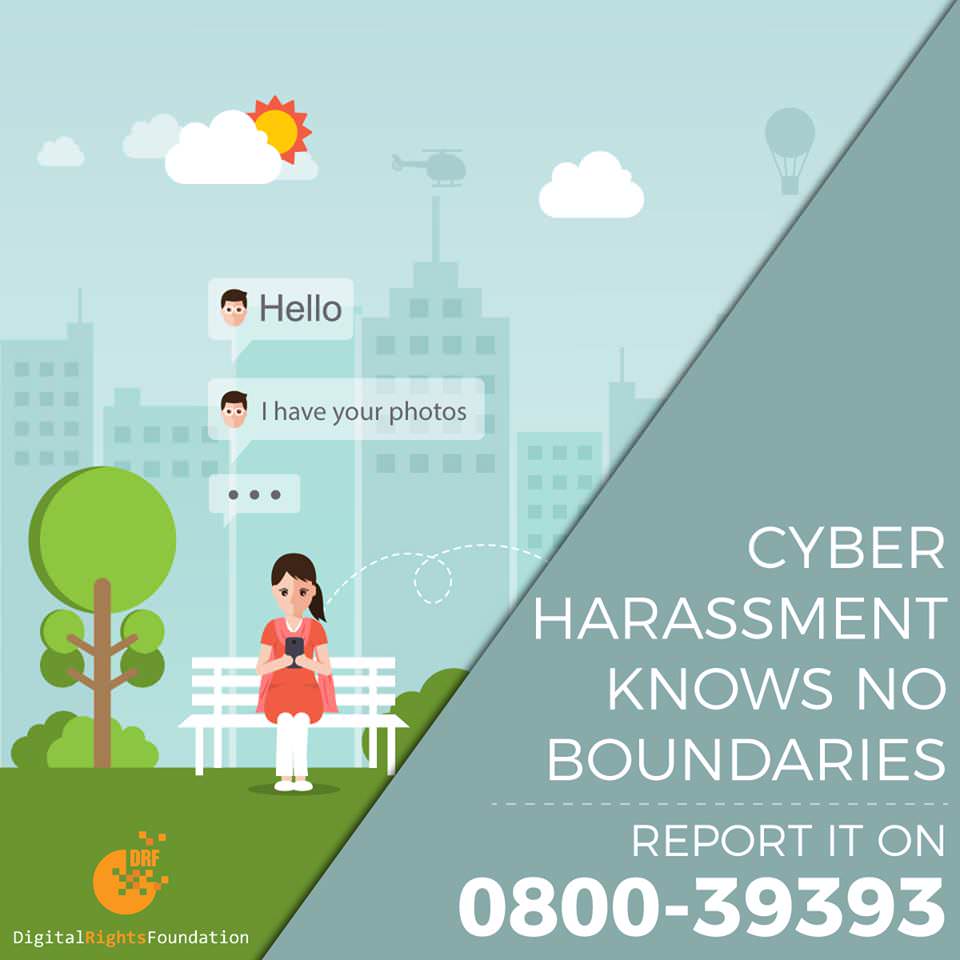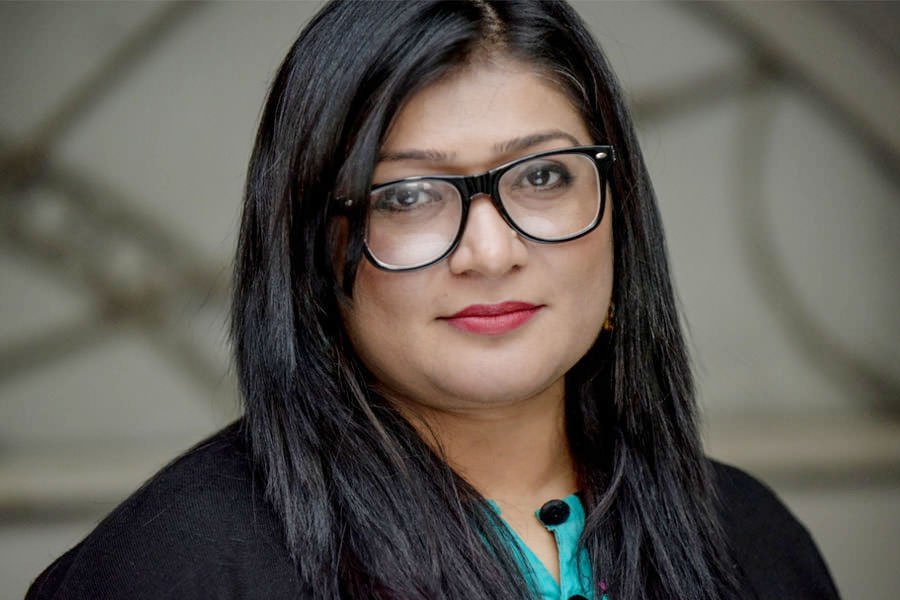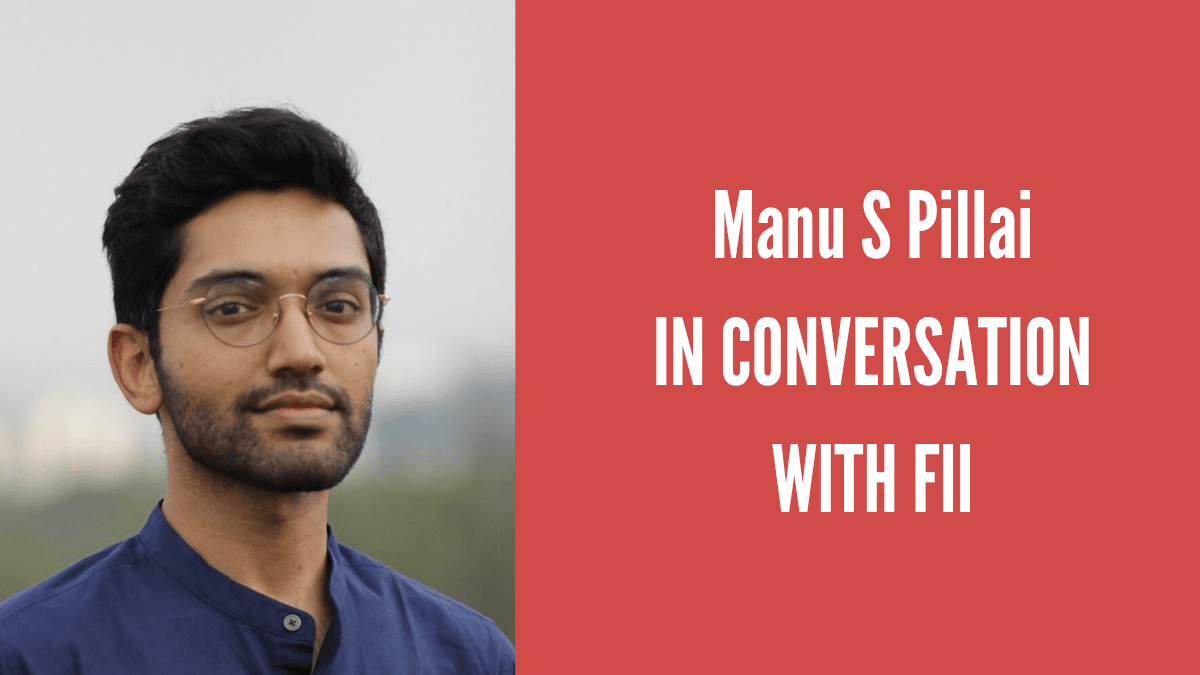In this series, Women In Power, we feature women who have done groundbreaking work in the field of gender, sexuality, women’s rights and the likes to get an insight into their lives and their work. More and more people are joining the feminist movement and working on gender and we wish to bring them in the limelight, one life at a time.
With pulsating advancements in technology and internet facilities come great freedom and responsibilities. However, increasingly, this has been taken for granted by many and used to harass some segments of the society. Social media happens to be the biggest platform of such abuse of technological accessibility. As there is no stringent censorship on the content shared online, on social media platforms, through cellular networking etc., people tend to misuse this perk as a method to target other people. The most affected parties of social media harassment are women, LGBTQ, religious minorities among others.
Digital rights are a relatively lesser known human rights phenomenon in South Asian societies. Masses are unaware of the rights and responsibilities that they have as a user of digital space and technology. Nighat Dad is a Pakistani lawyer and digital rights activist who campaigns actively to educate people about the rights and responsibilities they have in a digital space. Dad originally hails from Jhang, Punjab and has received her law degree in criminal and family law from The University of Punjab, Lahore. Dad has ample experience working in the digital rights arena and has recently won the prestigious Human Rights Tulip Award 2016. She is the executive director of the Digital Rights Foundation, an organisation that campaigns and educates the masses about online spaces, use of cellular phones and how to deal with online harassment. Her work is basically targeted to educate and empower the marginalized communities in order to fight online harassment.
Feminism in India spoke to Nighat Dad regarding her work experience as a digital rights activist, her take on the newly passed cybercrime bill, the role of DRF in empowering women and her plans on launching a cyber-harassment helpline in Pakistan.
Q1. When did you start working as a digital rights activist? Tell us about your work as a digital rights activist.
I founded the Digital Rights Foundation in 2012 with the goal to work around internet governance in Pakistan. Internet freedom, digital rights, educating the masses regarding their digital rights and responsibilities etc. are some of the main objectives of the Foundation. Additionally, the DRF also acts as a watchdog for surveillance of the cyber laws and policies. It keeps a close eye on how the government is regulating these cyber laws and campaigns against any surveillance carried out by the government on the digital spaces of people which transgresses the humanitarian boundaries. Moreover, the DRF also provides trainings and workshops to journalists, human rights activists, NGOs etc. to educate them on how they can use cyber space and their cellular phones in order to facilitate their work.
Q2. How did the idea of DRF cross your mind? Tell us the current projects DRF is working on.
The basic goal was to mainstream the idea of digital rights in the country. During my time as a digital rights activist, I have noticed that people are unaware of their rights and liberties in the online spaces. Surprisingly, a lot of mainstream organizations working for human rights issues did not have apt knowledge about the rights that people have in online spaces. Therefore, the main goal of DRF was to raise awareness regarding the internet freedom and also to inform the policy makers and legislators how they can make cyber laws that are human rights friendly.
At the moment, the DRF is involved in multiple projects ranging from digital security trainings, violence against women online, online surveillance etc. We are also working with different stakeholders, researching and releasing different reports on the matter. Every year, we issue a “Freedom On The Net” report, which analyses the issue of internet freedom in Pakistan. This report is conducted by Freedom House, a think-tank in the US, and Pakistan is amongst the 65 countries where this report is covered by different partners. So DRF is the foundation that does it from Pakistan, every year.
DRF also looks into different existing legislations regarding cyber spaces and how these legislations are being misused, for instance, the blasphemy law and how it is misused in online spaces. We released a similar report last year on blasphemy cases in digital spaces, in which we looked into different case studies. So we explore different areas where existing legislations are being misused by different entities.
DRF has also taken an initiative to draft a response to the legislation on data protection and the privacy protection mechanism in Pakistan. So we will be drafting a policy brief really soon and we will be sharing it with the members of the Parliament who have been very interested in the cybercrime debate. So we are looking forward to join hands with the policy makers to come up with a new data protection legislation which is very integral for internet users in Pakistan, who are not aware of their privacy rights or any other digital rights while they are using online spaces and mobile technologies.
Q3. Like you mentioned earlier, there is a scarcity of information amongst the masses regarding their digital rights. Why do you think this is so?
I think this is mainly because the area of digital rights is particularly and relatively newer than the traditional concept of human rights. Technology is going through a boom in the current century and as it is growing, the use of internet and mobile phones has increased. So, this whole digital space phenomenon has started after 2005. Now we have 3G and 4G in Pakistan which came 2-3 years ago, this allowed more access of internet to people. So I feel that accessibility (of technology and internet) was an issue and a cause of scarcity of information amongst the masses regarding the digital rights.
However, I also think that there is limited knowledge regarding this particular field because there are not a lot of people in Pakistan who are talking about it. There are only a handful of digital rights activists who talk about these issues and they are also sometimes silenced by the State, labelling them as propagandists and anti-state agents. There is a harrowing lack of digital literacy in our textbooks and literature which is also a reason why people are not aware of their digital rights and responsibilities.
This issue is, however, not just valid in the Pakistani context. This is a global issue and even many developed countries are struggling with the right balance of security versus internet freedom.
Q4. How does your work as a digital rights activist help women?
Under our campaign called the “Hamara Internet” campaign, we look into the issue of violence against women online. Our aim is to mainstream the idea of digital rights awareness amongst the women who use internet or cell phones. We think that women face a lot of problems when it comes to accessibility of technology – like patriarchal, cultural and societal restraints – which cause hindrances for women to access technology and internet. However, on the other hand we have a lot of women who use technological platforms to voice their opinions, example Qandeel Baloch and other feminist activists, who raise a voice on social media platforms regarding the misogyny and sexism in our society.
So, under Hamara Internet, we cover all these issues, from fighting online harassment to taking legal recourse. We help to equip women regarding legal cyber law actions, to take informed decisions, how to secure themselves in digital spaces; what to share and what not to share online etc. We encourage and empower women to reclaim their online spaces and fight back against the harassment that they go through online.
Q5. While working with women and other communities, did you face a lack of interest and enthusiasm on their part to learn and be better equipped with technology? If yes, what do you think could be the reasons for the same?
To be very honest, I always enjoy working with women. I recently worked with 40 front-line defender women from Baluchistan and Punjab. It was a training of a general nature, related to their security mechanism online and on cellular networks. They came from a very regressive background, yet they were really enthusiastic and passionate to learn about their security and personal spaces. They were well aware of the idea of technological and online privacy and wanted to learn more about it. They had some basic questions like how to lock their phones or change their passwords.
In my work experience, I have always found women to be very passionate about digital rights issues. They feel that technology should not be just a male dominated sphere; women need to participate more in such arenas and should not be dependent on men to tell them how they can deal with technology. So I think women who own devices or cell phones, no matter which background or class they belong to, are always very keen to explore the area of digital rights and online privacy.
Q6. Coming back to the Hamara Internet campaign, can you throw some light on the success (so far) of the campaign? Do you think there is a need for such campaigns not just in Pakistan, but worldwide?
The Hamara Internet campaign is a great success (so far) as we have received an overwhelming response for it. We have been to 12 different colleges and universities, so far, across Pakistan, from the most progressive to the most regressive areas. We covered a lot of different places and came across and around 1500 young women who participated in the campaign. This campaign officially started in January 2016 and we still plan to cover more universities by the end of 2016.
The feedback and the reception of the Hamara Internet campaign is how we scale our success in this venture. The girls who participated in the campaign received it very well and still stay in touch with us. They send us emails and messages and ask questions. If they are subjected to online harassments, they reach out to us and want to know how to take action against it. Women are finding support and guidance through Hamara Internet. They reach out to our team with questions and if they want to file a complaint with the FIA, we guide them on how to do that. The best part is that more and more women – who face online or cellular harassments – are coming out and reporting it to the FIA.
However, I think that we need to expand this campaign more – besides the helpline and the services we are providing. The helpline is a product of the sessions that we carried out at different universities so we will continue doing those. We at DRF are planning to carry out sessions at schools in the coming year to reach out to young children and teach them on how to be responsibe digital citizens. It is very impotant to teach our children how be more ethical when using the digital space. We see that mostly women are the ones getting harrased on the hands of men so it’s very important that children learn the ethical use of their digital space at a young age. This will make internet a safer place for our upcoming generations.
Also, I think that it is very important that every country – developing or developed – comes up with a similar campaign to ensure that the rights of women and other marginalized communities are not compromised. It is not just a Pakistani problem, it’s a global problem. Women around the world face some sort of online harassment ranging from false impersonation to revenge porn. We are lucky that we at least have some people in Pakistan who are talking about digital rights, unlike our neighbouring countries, except India. India is much more advanced when it comes to digital rights governance, but countries like Afghanistan, Nepal, Iran etc. need to replicate campaigns like Hamara Internet.
Q7. As your teams are touring the remotest areas of Pakistan, educating women about their digital rights, did you receive a backlash for it as well?
To tell you honestly, we did not receive any backlash when it came to educating women regarding their digital rights. So far, we got a lot of support from women themselves, sometimes even from the families hailing from regressive and conservative parts of the country. Masses in the KPK or lower Punjab regions are not very supportive of the fact that women should use social media, but they are glad that at least there is an organization out there that is policing the whole phenomenon and guiding women on how to protect themselves in cyber spaces.
However, having said that, there are few entities that create hindrances for you. They might be envious of your work or just plainly upset with your accomplishments. Though I am not comparing, to draw an analogy, my case is similar to that of Malala Yousufzai’s. When women are more successful and are making a mark, there are people – often educated – who target them. I face such backlash on a routine basis. People often wrongly assume that I am telling the world that women in Pakistan are not allowed to use internet and technology, which is completely untrue. I only highlight the facts prevalent in our society. I am often called a fraud – like Malala, I face threats and my credibility and reputation are often hurt on social media. However, this is more on a personal basis and not on the work that DRF does.
Q8. In one of the videos by Internet Society, you said that “The internet is what we make it.”
With the kind of free access the internet provides its users with, do you think it is possible to ensure that some users’ temptations to impinge on others’ privacy can be curbed? In that sense, is there a need to educate both the parties about the responsible uses of the internet?
There is a large amount of perpetuators who use internet to harass people and curb their digital privacy. I think it is very important that such people are fully aware that their actions will have consequences. We need to impart a general understanding that anyone who misuses the internet will be held responsible and punished. For this purpose, we now have a newly passed Cybercrime law –which is very ambiguous and concerning in terms of human rights violation – but it can be used positively to control crimes in digital spaces.
Q9. Speaking of the cybercrime bill, how do you think it will affect the freedom of speech and freedom to access of information in Pakistan?
Well, a lot of the provisions in the Cybercrime bill are violating the fundamentals of freedom of speech and freedom of access to information. The idea of freedom of speech in the Cybercrime bill is similar to the one we have in our Constitution, already. The law is very ambiguous and gives a lot of room for abuse, especially provisions like 34, 19A, 21, 22 etc. are very problematic.
Internet is a very free space and with the increased use of it, there is a lot of political participation online by the youth, especially. Internet is the only space that can be used by the masses, particularly the youth, to voice their opinions without fearing any form of censorship. However, with this bill, there will be a lot of self-censorship because it will spread a lot of fear and deterrence amongst the internet users. They will be more careful when sharing content online and criticizing political moves. This will definitely curb their freedom of speech and will also deter them from acquiring information.
However, I think the bill is not all negative. There are some provisions that are really the need of the time. We definitely need a Cyber crime law in Pakistan; there are no second thoughts on that. The only problem with the law is that it is very ambiguous and it has a lot of penalties and punishments for people who are not even aware of what constitutes cybercrime. There is a lack of awareness on such legislations. Some of these provisions are perfectly fine but again, criminalizing the voicing of opinions online is not fair and not as per the global standards. So I think that there is a dire need to educate the masses from the basics regarding internet literacy and this legislation lacks articulation and clarity.
Q10. You’ve just recently launched a cyber-harassment helpline in Pakistan. Can you please tell us more about the helpline and how it will help women deal with online violence?

Image Credit: Digital Rights Foundation
As I said, under Hamara Internet when we went to different educational institutes, one thing that came out of it was the need for a cybercrime helpline. We received a lot of complaints and questions from women who faced online harassment and other issues in online spaces and needed some sort of emotional support. They wanted to engage into one-to-one discussions. At that time, we did not have such facilities. It was very exhaustive for me to sit and talk to various different women and provide solutions for their problems.
We then realized that we need a proper mechanism for such issues. Anyone who wants to reach out to us and get emotional support or any legal guidance, they can call the helpline and get help. The helpline got launched on December 1st 2016). The main idea of this helpline is to provide digital security support to anyone who wants it – mainly young women and girls and other marginalized communities. If they have an urgent case of cyber harassment or their life is at risk, we will provide instant support for that. Our helpline will provide three things: emotional support, digital security support and legal advice.
Our main focus will be around digital security support where we will be helping people in making their accounts more secure and strengthening their privacy settings on social media. Digital security support will mainly be about helping people to secure themselves online. Legal advices will be based on the laws that we have regarding cyber harrasment – the one that just got passed – The Prevention of Electronic Crimes Act (PECA) 2016. We will be providing a complete guidance of the legal landscape to people who will want to register their complaints with the FIA, the legal process and the procedure after the complain has been registered. Lastly, we will be providing support to deal with the emotional trauma that is caused due to facing cyber harassment. We have a lot of cases where people are absolutely shook due to the rape threats or murder threats that they receive and they have no one to talk to. We will be listening to such callers and if we feel the need, we will refer them to other helplines like Rozan, who are doing some great work regarding emotional trauma caused by cyber bullying.
We will also work with existing helplines in Pakistan like The Punjab Commission on The Status of Women and Rozan etc., in a referral manner.
Q11. Lastly, please tell us what it means to have won The Human Rights Tulip award and how do you think this is going to help you further your fight for digital rights in Pakistan?
I believe that this award will help us in making the Pakistani government realize that since the other governments are acknowledging our efforts towards digital rights, our government should too. Also, we have been labeled an anti-state and propagandist organization at so many points, I think this should also put an end to such accusations. The award and the prize money that we are getting will be used to further the work that we are doing towards raising awareness regarding digital rights amongst the masses. We are also planning to expand our helpline with this prize money. So yes, this award gave us a lot of respect, credibility and prestige for our work nationally and internationally, and will help us furthur our fight for digital rights in Pakistan.
You can visit DRF’s website here. Nighat tweets at: @nighatdad
About the author(s)
A Pakistani journalist and Culture & Gender scholar at the University of Sydney, Amna Nasir considers herself a hard-core feminist. She is a travel enthusiast and expresses herself through painting, sketching, photography and writing. As clichéd as it may sound, Amna believes in equality of all beings irrespective of their background, colour, gender, religion or ethnicity.




